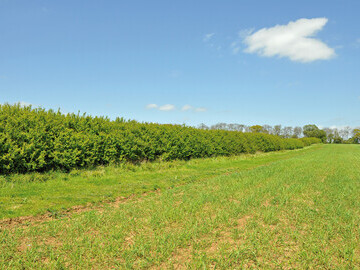Hedgerow Carbon Code: “good news for UK agriculture, climate change and British wildlife”
Unlocking the environmental and income-generation potential of hedgerows in the British countryside is a step closer
National Hedgerow Week, 17 – 25 September 2022
Unlocking the environmental and income-generation potential of hedgerows in the British countryside is a step closer as the Game & Wildlife Conservation Trust (GWCT) begins piloting the new Hedgerow Carbon Code. The Code will encourage hedgerow habitat improvements to increase the amount of carbon stored by hedges, contributing to British farming’s net-zero target and boosting biodiversity. It will allow land managers to calculate and verify the carbon capture potential of their hedgerows, enabling them to trade carbon credits – a market with a potential value of £60m.
“We now have a trial Hedgerow Carbon Code,” said Dr Alastair Leake, project lead and GWCT Director of Policy and the Allerton Project, a year on from receiving an £81.5k grant from the government’s Natural Environment Investment Readiness Fund for the project.
“Pilots have begun with three arable farms in England, where we are evaluating the practicality of the Code and the carbon calculation tool and developing it with the input of farmers on the ground.
“We are also looking at ways in which land managers who are already generating carbon and biodiversity benefits through good hedgerow management can be recognised and rewarded.”
Hedgerows sequester carbon at twice the rate of woodland because of their 3-dimensional linear structure and England's hedges already store 9m tonnes of carbon. Similar to the Woodland Carbon Code, the new code will become the quality assurance standard for hedgerows and aims to generate hedgerow carbon credits, independently certified by Organic Farmers & Growers - who already do the same for the Woodland Carbon and Peatland Codes.
“Many arable farms have old hedgerows which are no longer needed for their primary function of containing livestock, so there is little incentive to maintain them,” said Alastair. “But, if we can attach a value to them, through recognising their carbon sequestration and biodiversity benefits and rewarding farmers for these, then we could incentivise further hedgerow restoration,” said Alastair.
The UK government has set out its ambition for British agriculture to be zero-carbon by 2050, while the National Farmers Union has a more ambitious target of 2040. Independent statutory body The Climate Change Committee has identified hedgerow planting as a way to help reach that target.
The Hedgerow Carbon Code includes a tool which will enable the carbon stored in a hedge to be calculated and verified, incentivising land managers to plant and manage hedgerows - an important part of the government’s new Sustainable Farming Incentive. The tool also has the potential to be developed further to monitor hedgerow biodiversity for calculating biodiversity credits.
“Going forward, planting and managing hedgerows well will enable land managers to access the Sustainable Farming Incentive and open opportunities to generate income from carbon and biodiversity credit trading,” said Alastair. “That can only be good news for UK agriculture, climate change and British wildlife.”
The development of the Hedgerow Carbon Code is being welcomed by the UK food industry. Kellogg’s, as part of their “Origins” programme, has been working with the GWCT’s Allerton Project demonstration farm, where the Code is being developed. Duncan Rawson, from EFFP who manages the Origins programme in the UK on behalf of Kellogg’s, said:
“The Origins Programme invests into sustainable farming practices, working with Kellogg’s farmers to help improve productivity and environmental performance, with a particular focus on climate change and biodiversity. Quantification of the on-farm sequestration of carbon is important to demonstrate the range of carbon benefits which agriculture can provide and to enable the food sector to meet carbon reduction ambitions.”
Ends
Note to editors:
The Game & Wildlife Conservation Trust – providing research-led conservation for a thriving countryside. The GWCT is an independent wildlife conservation charity which has carried out scientific research into Britain’s game and wildlife since the 1930s. We advise farmers and landowners on improving wildlife habitats. We employ 22 post-doctoral scientists and 50 other research staff with expertise in areas such as birds, insects, mammals, farming, fish and statistics. We undertake our own research as well as projects funded by contract and grant-aid from Government and private bodies.
The GWCT Allerton Project www.allertontrust.org.uk/
The GWCT Allerton Project is a combination of commercial farming, research, demonstration and community engagement, based on a 320-hectare estate in Leicestershire, United Kingdom. The Project researches the effects of different farming methods on wildlife and the environment, sharing results of our research through advisory and educational activities.
We identify management that delivers multiple benefits for our rural landscape. Our work covers natural capital accounting, agri-environment schemes and regenerative farming systems. From soil and water, to woodland and environmental habitat that increases biodiversity, our aim is to build farmland resilience. Our own research team collaborate with other research organisations and help co-supervise numerous PhD and MSc projects.
Natural Environment Investment Readiness Fund.
More information: https://www.gov.uk/government/news/innovative-nature-projects-awarded-funding-to-drive-private-investment
Press release distributed by Pressat on behalf of Game & Wildlife Conservation Trust, on Friday 16 September, 2022. For more information subscribe and follow https://pressat.co.uk/
Carbon Sequestration Carbon Credits Carbon Trading Biodiversity National Hedgerow Week Hedgerows Hedges Farmers Climate Change Committee Business & Finance Charities & non-profits Environment & Nature Farming & Animals Manufacturing, Engineering & Energy
You just read:
Hedgerow Carbon Code: “good news for UK agriculture, climate change and British wildlife”
News from this source:


